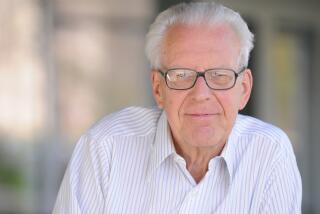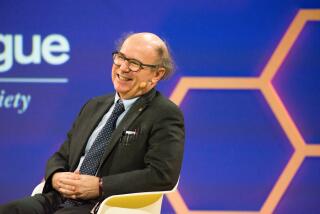BOOK REVIEW : Astronomer’s View of the Universe : ASTRONOMER BY CHANCE <i> by Bernard Lovell</i> Basic Books $24.95, 381 pages
- Share via
For more than a decade now, the Alfred P. Sloan Foundation has sponsored the publication of first-person books (I hesitate to call them autobiographies) by major scientists, who have written about their lives, their work, the practice of science, the nature of knowledge and what they’ve learned along the way.
Almost all of them have been very good books, distinguished by their warmth, eloquence and richness of tone. Freeman Dyson’s “Disturbing the Universe,” the first in the series, set a high standard of personal and scientific insight. Lewis Thomas’ “The Youngest Science,” Francois Jacob’s “The Statue Within” and Francis Crick’s “What Mad Pursuit” have been among the best first-person books by scientists in recent years. (Jacob’s book was particularly unusual in that the author, a French Nobel Prize laureate in medicine, did not discuss his scientific work until nearly three-quarters of the way through. Nonetheless--or as a result?--the book was riveting.)
“Astronomer by Chance,” Bernard Lovell’s story of his life as a physicist, radiophysicist and astronomer, is the 15th book in the Sloan series, and it is as good as the rest. Lovell, the founder of Jodrell Bank, Britain’s center of radioastronomy, speaks in the now-familiar voice of a successful scientist. He writes with awe about the scientific enterprise and about the ability to know the universe by reason. But that’s not all he has to say on that subject.
The Sloan books have varied in approach and style, but they have all looked at the world through the eyes of the Enlightenment. They tend to be reverential about science and the scientific method. Reason is the way to knowledge. Liberal discourse between well-intentioned people acting in good faith leads to the truth--or at least gets you closer to it.
In a sense, this remains the central belief of our age, and there is much evidence to support it. Lovell writes from within this tradition. It infuses his reasonable prose. But he also writes with another voice:
“The arrogant belief prevalent in my youth in the ultimate power of science to explain the universe and all that lies within has passed with the experience that the search for solutions uncovers ever deeper mysteries. Today the world of the scientist is less hostile to the view that science does not have the sole prerogative of acquiring ultimate knowledge.”
Toward the end of the book, in the chapter titled, “My Life and Thought,” Lovell tells us of his interest in “the interfacing regions of theology, philosophy, and science.” He acknowledges that readers may be surprised to hear him say it, given the general tone and view of the book so far, but, he says, “science has never claimed the whole of my existence.”
A discussion of theology ensues, with references to the writings of Karl Barth, Paul Tillich and Alfred North Whitehead. “Perhaps as I age I shall agree more and more with Paul Tillich that God is Being itself,” Lovell writes. He goes on for a few paragraphs to explain this. Readers interested in the details may turn to Pages 353 and following for a full discussion of the matter.
But I’m misleading you. Most of the book doesn’t have anything to do with theology. Most of it has to do with the development of radioastronomy, whose findings have opened conundrums that are at the heart of modern astrophysics and cosmology. As in many areas of science, our ability to gather data about the structure of the universe outstrips our ability to put it together in a coherent account.
Lovell, who was born in 1913, was an undergraduate physics student at the University of Bristol when the revolution in physics got going. He saw certainty give way to uncertainty. In his first two years at Bristol, he went to lectures in classical physics. In his last two years, he went to lectures in quantum mechanics.
“The superb clarity and beauty of these lectures remain a vivid memory,” Lovell recalls. “The determinate and certain world of common experience disappeared before our eyes as the probability functions of the wave equations became the new world of science that we were to inherit.”
He spent World War II helping to develop radar, and then wound up with equipment that he deposited at Jodrell Bank, a tract of land provided by a botanist colleague at the University of Manchester.
Lovell’s eye for detail and memory for vignettes add texture to his measured and considered prose. There is much to learn here.
Next: Jonathan Kirsch reviews “Captain Sir Richard Francis Burton: The Secret Agent Who Made the Pilgrimage to Mecca, Discovered the Kama Sutra , and Brought the Arabian Nights to the West” by Edward Rice.
More to Read
Sign up for our Book Club newsletter
Get the latest news, events and more from the Los Angeles Times Book Club, and help us get L.A. reading and talking.
You may occasionally receive promotional content from the Los Angeles Times.







